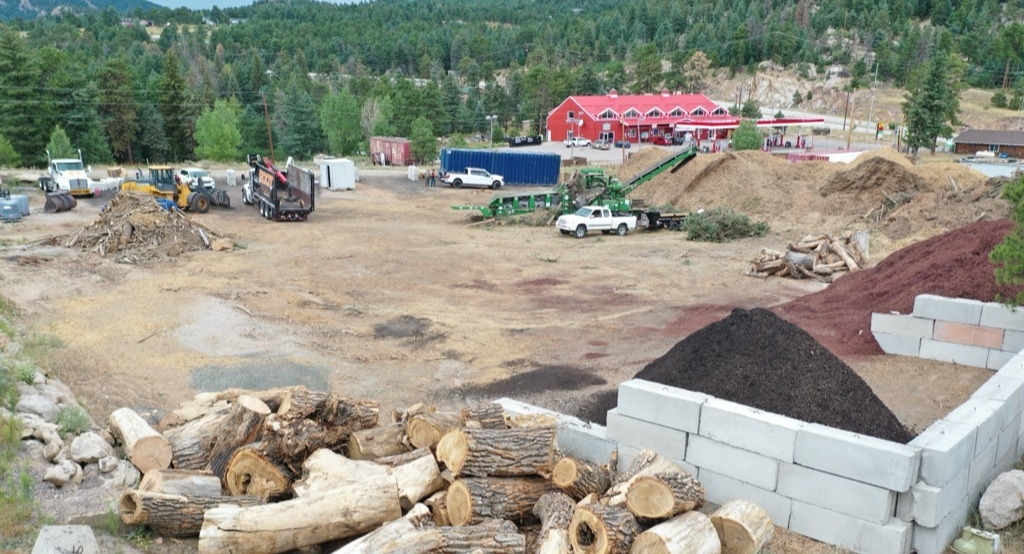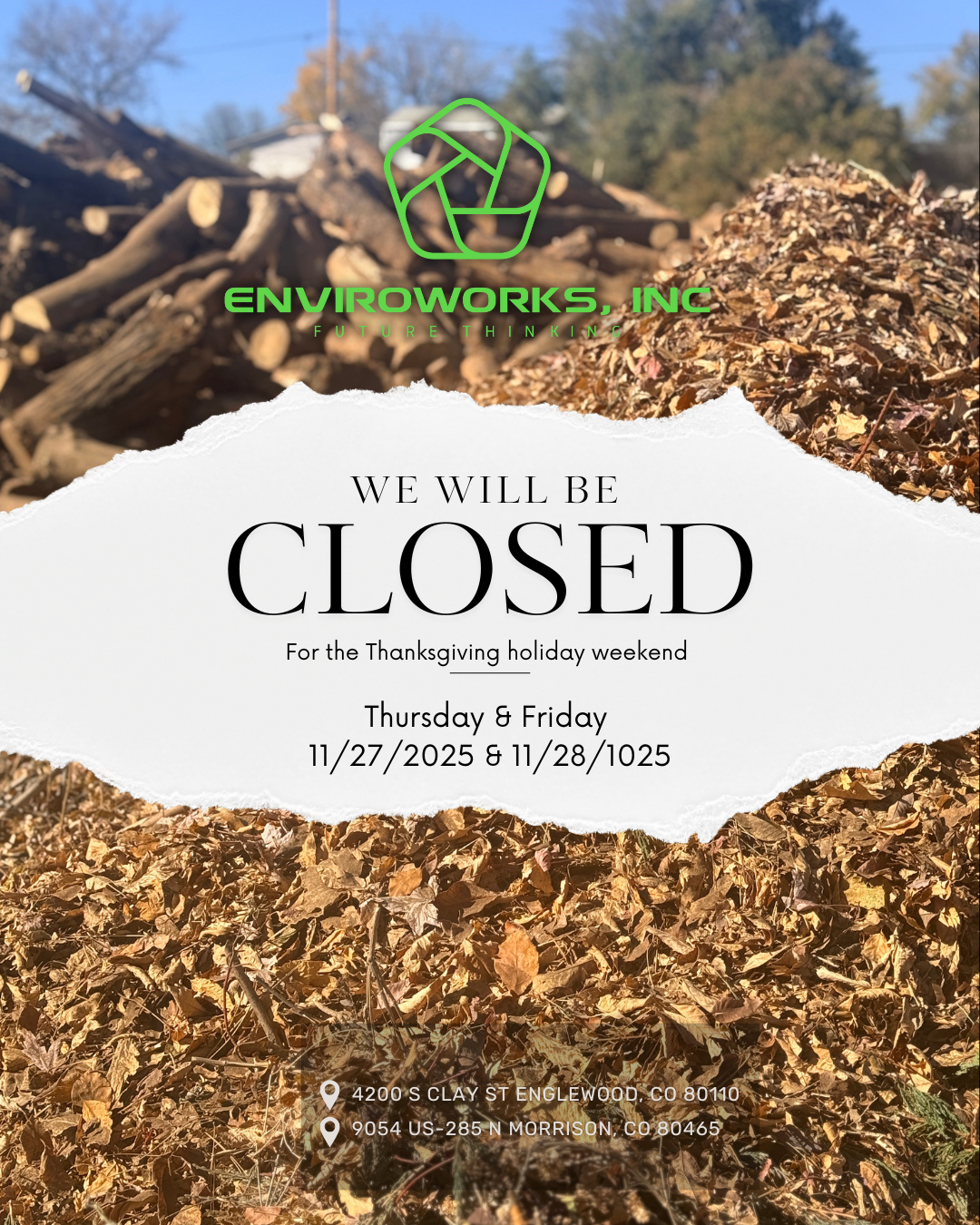What Happens to Your Tree Debris? Inside the Mulch-Making Process
As Colorado homeowners, we often find ourselves tackling tasks like tree trimming or yard clean-up, resulting in piles of branches, leaves, and other organic debris. But what happens to all that tree waste once it leaves your property? Many of us drop off our yard waste at designated facilities, yet few understand the fascinating journey that follows. Let’s take a closer look at the mulch-making process and discover how your tree debris is transformed into eco-friendly mulch.
The Drop-Off
When you bring your tree debris to one of our drop-off locations in Morrison or Englewood, Colorado, you might notice that you’re not alone. Many homeowners, tree care specialists, and landscapers in your community do the same, all contributing to a larger pool of organic material. This collective effort helps keep our neighborhoods clean and promotes sustainability by recycling tree waste instead of sending it to a landfill.
Collecting and Sorting
Once the tree debris arrives at the yard, it undergoes a sorting process. Large equipment, such as grinders and chippers, is used to break the pieces down into smaller, manageable sizes. This makes the material easier to process and ensures a more uniform finish for the mulch. EnviroWorks, Inc., accepts branches, limbs, prunings, and logs. We will not accept trash of any kind, plastics, metals, root balls, rocks, bricks, concrete, any treated materials, paper, cardboard, glass, drywall, sod, or dirt
Grinding and Drying
There’s something satisfying about watching massive grinders chew through piles of logs and branches. This step is crucial in the mulch-making process. The shredded material is reduced to uniform chips that facilitate the breakdown process and enhance the final texture of the mulch.
Once the grinding is complete, the processed wood enters a drying phase where moisture is carefully reduced. This not only helps in extending the mulch's longevity but also prevents the growth of mold and fungi. As the mulch continues to mature, it develops rich organic qualities, making it a valuable resource for gardens and landscaping. The vibrant colors created during this process also add an aesthetic appeal, transforming the ground into a lush, visually pleasing environment. Whether used in gardens, pathways, or playgrounds, the final product serves multiple purposes, from conserving soil moisture to suppressing weeds, providing both practical benefits and aesthetic appeal to outdoor spaces.
Composting and Aging
Once the tree debris has been ground, the wood chips require time to decompose naturally. This is where magic happens. The shredded material is typically piled up and allowed to age, either in open piles or in controlled environments. During this period, microorganisms break down the wood fibers, enriching the material and enhancing their nutritional profile. This composting phase can take several months, yielding a product that is not only visually appealing but also rich in benefits for your garden.
Quality Control
As the mulch ages, its quality is monitored through a series of rigorous assessments. These evaluations ensure that the material remains free from pathogens, contaminants, and unwanted weed seeds. Various factors, such as temperature and moisture levels, are closely observed during the aging process, as they play a key role in the breakdown of organic materials and the development of beneficial microorganisms.
Furthermore, color and texture tests are conducted to ensure that the mulch has reached an optimal stage of decomposition. Well-aged mulch will typically have a rich, dark color and a crumbly texture, indicating that it is decomposing properly and can effectively retain moisture and suppress weeds once applied to the garden.
This crucial step not only guarantees that the mulch you ultimately place in your landscaping is safe and beneficial for your garden, but it also enhances soil structure, improves water retention, and promotes healthy plant growth, making it a valuable addition.
Final Processing
After the aging and quality control stages, the mulch is ready for final processing. It may be further shredded to achieve the desired consistency and color. Some facilities even offer coloring services to provide an array of color options that can enhance the beauty of your landscaping. The coloring process typically involves using natural dyes that are safe for the environment, enabling vibrant shades without harming plants or soil.
In addition to aesthetic benefits, colored mulch can help retain moisture in the soil and suppress weed growth, making it a decorative and functional choice. Once processed, the finished mulch undergoes a final quality check to ensure it meets safety standards and is free from contaminants.
The finished product is often available for purchase. Homeowners, landscapers, and garden centers are typical buyers. Applying mulch effectively maximizes the benefits for gardens and landscapes. With the right mulch, you can enhance not only the appearance of your outdoor space but also promote healthy plant growth and ecosystem balance.
Friendly Benefits of Mulch
Using mulch made from recycled tree debris offers numerous benefits. It helps retain soil moisture, suppresses weeds, and enhances the aesthetics of your landscaping. Additionally, it enriches the soil as it breaks down, providing essential nutrients for your plants. By using this eco-friendly alternative, you’re participating in a sustainable cycle that reduces waste and promotes a healthier environment.
Conclusion
So, the next time you clear your yard and take your tree debris to one of EnviroWorks, Inc.'s drop-off sites in Morrison or Englewood, Colorado, you can feel good knowing it won’t just fade away into a landfill. Instead, it will be converted into nutrient-rich mulch that supports healthy gardens and sustainable practices in your community. When you use mulch made from recycled materials, you’re making an eco-conscious choice that benefits both your landscape and the planet. If you have any questions about mulch or either of our drop-off locations, please contact us at 720.948.9449 or on our website, EnviroWorks, Inc.
Go Back The Drop-Off
When you bring your tree debris to one of our drop-off locations in Morrison or Englewood, Colorado, you might notice that you’re not alone. Many homeowners, tree care specialists, and landscapers in your community do the same, all contributing to a larger pool of organic material. This collective effort helps keep our neighborhoods clean and promotes sustainability by recycling tree waste instead of sending it to a landfill.
Collecting and Sorting
Once the tree debris arrives at the yard, it undergoes a sorting process. Large equipment, such as grinders and chippers, is used to break the pieces down into smaller, manageable sizes. This makes the material easier to process and ensures a more uniform finish for the mulch. EnviroWorks, Inc., accepts branches, limbs, prunings, and logs. We will not accept trash of any kind, plastics, metals, root balls, rocks, bricks, concrete, any treated materials, paper, cardboard, glass, drywall, sod, or dirt
Grinding and Drying
There’s something satisfying about watching massive grinders chew through piles of logs and branches. This step is crucial in the mulch-making process. The shredded material is reduced to uniform chips that facilitate the breakdown process and enhance the final texture of the mulch.
Once the grinding is complete, the processed wood enters a drying phase where moisture is carefully reduced. This not only helps in extending the mulch's longevity but also prevents the growth of mold and fungi. As the mulch continues to mature, it develops rich organic qualities, making it a valuable resource for gardens and landscaping. The vibrant colors created during this process also add an aesthetic appeal, transforming the ground into a lush, visually pleasing environment. Whether used in gardens, pathways, or playgrounds, the final product serves multiple purposes, from conserving soil moisture to suppressing weeds, providing both practical benefits and aesthetic appeal to outdoor spaces.
Composting and Aging
Once the tree debris has been ground, the wood chips require time to decompose naturally. This is where magic happens. The shredded material is typically piled up and allowed to age, either in open piles or in controlled environments. During this period, microorganisms break down the wood fibers, enriching the material and enhancing their nutritional profile. This composting phase can take several months, yielding a product that is not only visually appealing but also rich in benefits for your garden.
Quality Control
As the mulch ages, its quality is monitored through a series of rigorous assessments. These evaluations ensure that the material remains free from pathogens, contaminants, and unwanted weed seeds. Various factors, such as temperature and moisture levels, are closely observed during the aging process, as they play a key role in the breakdown of organic materials and the development of beneficial microorganisms.
Furthermore, color and texture tests are conducted to ensure that the mulch has reached an optimal stage of decomposition. Well-aged mulch will typically have a rich, dark color and a crumbly texture, indicating that it is decomposing properly and can effectively retain moisture and suppress weeds once applied to the garden.
This crucial step not only guarantees that the mulch you ultimately place in your landscaping is safe and beneficial for your garden, but it also enhances soil structure, improves water retention, and promotes healthy plant growth, making it a valuable addition.
Final Processing
After the aging and quality control stages, the mulch is ready for final processing. It may be further shredded to achieve the desired consistency and color. Some facilities even offer coloring services to provide an array of color options that can enhance the beauty of your landscaping. The coloring process typically involves using natural dyes that are safe for the environment, enabling vibrant shades without harming plants or soil.
In addition to aesthetic benefits, colored mulch can help retain moisture in the soil and suppress weed growth, making it a decorative and functional choice. Once processed, the finished mulch undergoes a final quality check to ensure it meets safety standards and is free from contaminants.
The finished product is often available for purchase. Homeowners, landscapers, and garden centers are typical buyers. Applying mulch effectively maximizes the benefits for gardens and landscapes. With the right mulch, you can enhance not only the appearance of your outdoor space but also promote healthy plant growth and ecosystem balance.
Friendly Benefits of Mulch
Using mulch made from recycled tree debris offers numerous benefits. It helps retain soil moisture, suppresses weeds, and enhances the aesthetics of your landscaping. Additionally, it enriches the soil as it breaks down, providing essential nutrients for your plants. By using this eco-friendly alternative, you’re participating in a sustainable cycle that reduces waste and promotes a healthier environment.
Conclusion
So, the next time you clear your yard and take your tree debris to one of EnviroWorks, Inc.'s drop-off sites in Morrison or Englewood, Colorado, you can feel good knowing it won’t just fade away into a landfill. Instead, it will be converted into nutrient-rich mulch that supports healthy gardens and sustainable practices in your community. When you use mulch made from recycled materials, you’re making an eco-conscious choice that benefits both your landscape and the planet. If you have any questions about mulch or either of our drop-off locations, please contact us at 720.948.9449 or on our website, EnviroWorks, Inc.

